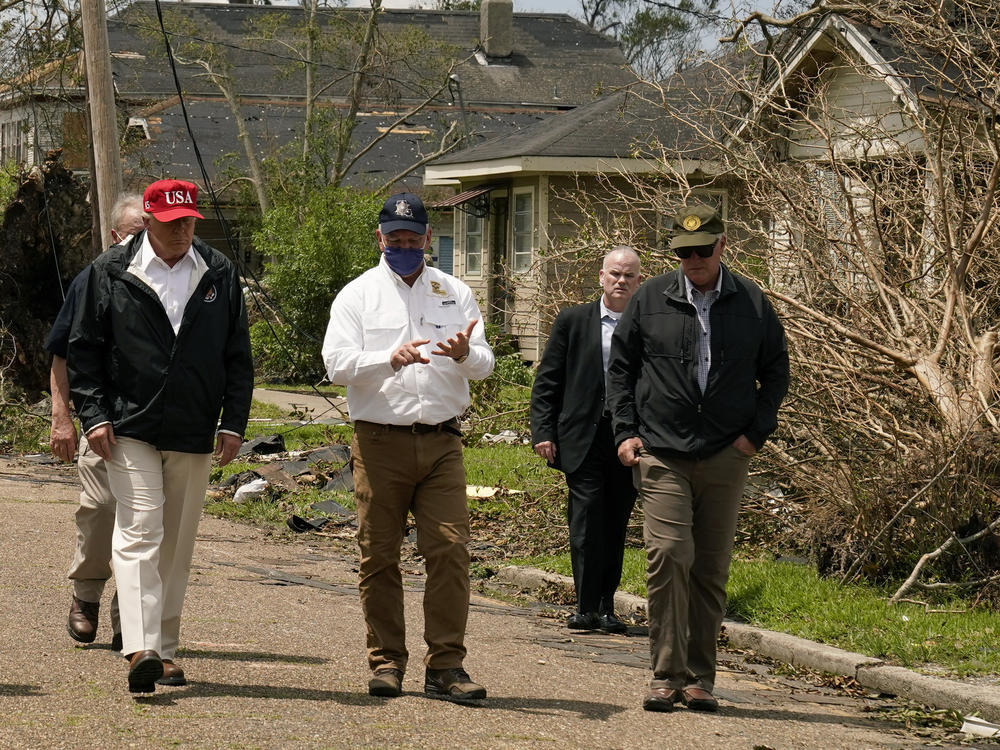Section Branding
Header Content
President Trump Visits Areas Hardest Hit By Hurricane Laura
Primary Content
President Trump visited Louisiana and Texas on Saturday afternoon to survey damage caused by Hurricane Laura. The storm killed at least 14 people and caused as much as $12 billion in damage.
Air Force One first touched down in Lake Charles, La., to scenes of debris, downed trees and badly damaged buildings and homes. Trump deplaned wearing a red had that said "USA" on the front, and "TRUMP" on the back. He was not wearing a mask.
After a tour of some of the hardest hit neighborhoods, the president spoke to first responders, local leaders, FEMA and DHS officals and members of the press.
"This is some devastation," he said to the assembled crowd, asking Louisiana Gov. John Bel Edwards how many people affected had insurance. The governor responded that about 50% did.
"I'm here to support the great people of Louisiana, it's been a tremendous state for me. I love the people," Trump said. "One thing I know about this state, they rebuild it fast, there's no problem. And we'll supply what we have to supply."
He said FEMA has delivered 2.6 million liters of water and 1.4 million meals to the area so far, and that local officials are working hard to restore water and power to hundreds of thousands of households.
While Trump did note that storms are more frequent and stronger than those decades ago, he did not directly connect that to climate change when asked, saying this area has always been prone to storms.
Scientists say that hurricanes are more likely to be larger and more powerful when they form over hotter ocean water. Climate change is causing global sea surface temperatures to rise.
"This was a tremendously powerful storm," he said. "In fact, when it came in it was actually much bigger than Katrina, I would say, Katrina being somewhat of a landmark."
Saturday is the 15th anniversary of Hurricane Katrina, which made landfall as a Category 3 storm and devastated New Orleans. Hurricane Laura was a Category 4 storm when it hit the Gulf Coast. Katrina ranks not only the costliest-ever U.S. hurricane, but as the most expensive natural disaster in the country's history, according to NOAA. The storm killed 1,836 people, left millions homeless and caused an estimated $160 billion in damage.
Noting the anniversary, President Trump stressed that Louisiana would rebuild after this disaster too.
"You came together and you rebuilt. America helped," he said. "And here we are today, and you're going to have this situation taken of very, very quickly."
Gov. Edwards said that although Hurricane Laura did not cause as much damage as forecasts originally predicted, the storm left an incredible mark on the state.
"With Katrina, people heard more about it because the levees broke," he said. "But this is as bad as I've ever seen it, folks."
The president then departed for Orange, Texas, another area hit hard by the hurricane earlier this week, where he was met with a round table of members of his own administration, members of Congress and local public officials.
He began the briefing by noting the damage to Louisiana, saying the state "went through something pretty bad."
"I don't think that you got anything like that, so that's good," Trump said of the damage Texas faced in comparison to Louisiana.
"In many ways we had a blessing with this hurricane in that it could have been much, much worse," Texas Republican Sen. Ted Cruz said, adding that while the damage was profound, it was not as extreme as the damage done to Louisiana.
Texas Gov. Greg Abbott said Thursday that the state sustained less damage than expected. Thousands of Texans lost power, and at least four people died in Texas from the storm, according to reports.
Trump was asked, again, in Texas about the connection of climate change to the hurricane. "We've had tremendous storms in Texas for many decades and for many centuries and that's the way it is," he said. "We handle them as they come. All I can do is handle them as they come and that's what we do and nobody has ever done a better job of it."
Copyright 2020 NPR. To see more, visit https://www.npr.org.

